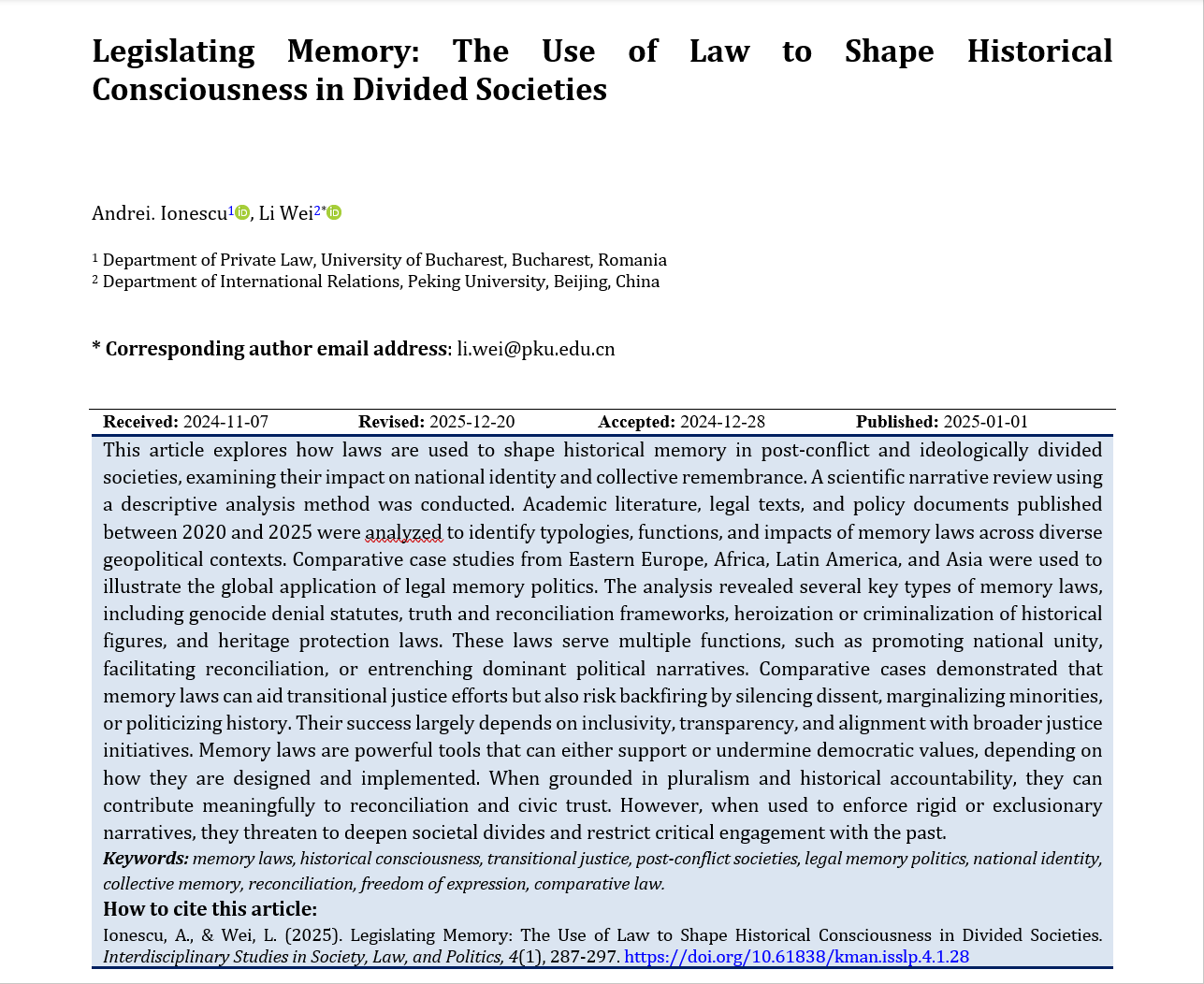Legislating Memory: The Use of Law to Shape Historical Consciousness in Divided Societies
Keywords:
memory laws, historical consciousness, transitional justice, post-conflict societies, legal memory politics, national identity, collective memory, reconciliation, freedom of expression, comparative lawAbstract
This article explores how laws are used to shape historical memory in post-conflict and ideologically divided societies, examining their impact on national identity and collective remembrance. A scientific narrative review using a descriptive analysis method was conducted. Academic literature, legal texts, and policy documents published between 2020 and 2025 were analyzed to identify typologies, functions, and impacts of memory laws across diverse geopolitical contexts. Comparative case studies from Eastern Europe, Africa, Latin America, and Asia were used to illustrate the global application of legal memory politics. The analysis revealed several key types of memory laws, including genocide denial statutes, truth and reconciliation frameworks, heroization or criminalization of historical figures, and heritage protection laws. These laws serve multiple functions, such as promoting national unity, facilitating reconciliation, or entrenching dominant political narratives. Comparative cases demonstrated that memory laws can aid transitional justice efforts but also risk backfiring by silencing dissent, marginalizing minorities, or politicizing history. Their success largely depends on inclusivity, transparency, and alignment with broader justice initiatives. Memory laws are powerful tools that can either support or undermine democratic values, depending on how they are designed and implemented. When grounded in pluralism and historical accountability, they can contribute meaningfully to reconciliation and civic trust. However, when used to enforce rigid or exclusionary narratives, they threaten to deepen societal divides and restrict critical engagement with the past.
Downloads
References
Abdurrahmani, B., & Abdurrahmani, T. (2024). Transitional Justice in Albania: The Politics of Truth Revelation About Past Human Violations Through Access to the Secret Files and Preservation of the Collective Memory. Journal of Educational and Social Research, 14(3), 166. https://doi.org/10.36941/jesr-2024-0064
Akmalie, R., & Aminah, S. (2023). The Shaping of Japan’s Collective Memory in Yoko Ogawa’s the Memory Police. European Journal of Humanities and Social Sciences, 3(3), 22-31. https://doi.org/10.24018/ejsocial.2023.3.3.426
Balynska, O. (2024). Memory as a Semiotic Tool for Formation of General Human Rights and the Historical and National Legal Policy of the State. Analytical and Comparative Jurisprudence(1), 746-753. https://doi.org/10.24144/2788-6018.2024.01.132
Bán, M. (2023). The Governance of History via Law: An Overview. Hungarian Journal of Legal Studies, 63(4), 315-328. https://doi.org/10.1556/2052.2022.00410
Barnes‐Gilbert, A. (2023). A Tale of Two Annies: Historical Memory, Archives and the Perpetuation of the Sinners to Angels Trope in American Sex Worker History. Gender & History. https://doi.org/10.1111/1468-0424.12746
Batyrbayev, В. S. (2024). The Politics of Memory in Kyrgyzstan: The Formation of National Identity in the Context of the Formation of the Kara-Kyrgyz Autonomous Region. Russia & World Sc Dialogue(3), 188-199. https://doi.org/10.53658/rw2024-4-3(13)-188-199
Chekmazov, A. I., & Uziumova, A. V. (2022). The Role of State and Non-State Actors in the Memory Policy: Comparative Analysis of Finland and Spain. Vestnik Povolzhskogo Instituta Upravleniya, 22(1), 45-52. https://doi.org/10.22394/1682-2358-2022-1-45-52
Colman, A. (2023). Modes of Production, Circulation, and Academic Recognition of an ‘Archive of Repression’: The Case of the DIPPBA Archive in Argentina. Punctum International Journal of Semiotics, 9(2), 55-81. https://doi.org/10.18680/hss.2023.0019
Dorskaya, A., & Dorskiy, A. (2021). Historical Memory as the Object of International Law and National Regulations. Russian Foundation for Basic Research Journal Humanities and Social Sciences, 85-96. https://doi.org/10.22204/2587-8956-2020-099-02-85-96
Dorskaya, A., & Бондарев, В. И. (2021). International Research-to-Practice Conference “Legal Forms of Experiencing History: Practices and Limits” (St. Petersburg, September 11–12, 2020). Russian Foundation for Basic Research Journal Humanities and Social Sciences, 136-140. https://doi.org/10.22204/2587-8956-2021-103-01-136-140
Dovhanych, V. (2023). Lessons of Liberation Struggles and Legal Ideas of Ukrainians in the 19th Century for Today. Scientific and Informational Bulletin of Ivano-Frankivsk University of Law Named After King Danylo Halytskyi(16(28)), 32-40. https://doi.org/10.33098/2078-6670.2023.16.28.32-40
Dunamalyan, N. (2025). Integration of Historical Memory of National Minorities in Armenia: The Problem of Shared Historical Trauma. World Economy and International Relations, 69(1), 87-101. https://doi.org/10.20542/0131-2227-2025-69-1-87-101
Egorova, U. P., & Vasiliev, K. E. (2024). Protection of Historical Truth: Legal Regulation. Jour(4), 23-25. https://doi.org/10.25587/2587-5612-2023-4-23-25
Filimonova, K. N. (2023). Historical and Memorial Activities of Rossotrudnichestvo Abroad: Results, Problems, and Prospects. Genesis Исторические Исследования(11), 135-142. https://doi.org/10.25136/2409-868x.2023.11.39284
Home, R., & Armia, M. S. (2025). Decolonising Israel/Palestine: An Approach to the Legal History of the Middle East. Petita Jurnal Kajian Ilmu Hukum Dan Syariah, 10(1). https://doi.org/10.22373/petita.v10i1.805
Horonziak, S., & Kaim, M. (2023). Mnemonic Governance. https://doi.org/10.3726/b21291
Ivangorodsky, K. (2023). Memorial Legislation of the Russian Federation as Occupation Policy Tool: Historical and Legal Analysis. Part I. Theory and Practice of the Kremlin’s Historical Policy. Cherkasy University Bulletin Historical Sciences(1), 78-92. https://doi.org/10.31651/2076-5908-2023-1-78-92
Kirnosov, I. D. (2024). Historical Memory as a Category of Constitutional Law. Izvestiya of Saratov University Economics Management Law, 24(1), 99-106. https://doi.org/10.18500/1994-2540-2024-24-1-99-106
Korobitsyna, L. V. (2023). Historical Heritage as a Value of Russian Society: Historical and Legal Perspective. History Facts and Symbols, 35(2), 118-125. https://doi.org/10.24888/2410-4205-2023-35-2-118-125
Kurtaran, U. (2024). National Identity and Historical Memory: Functionality of Historical Memory in the Formation and Development of National Identity. 5(2), 64-71. https://doi.org/10.62425/dssh.1494987
Mulderig, B., Carriere, K. R., & Wagoner, B. (2024). Memorials and Collective Memory: A Text Analysis of Online Reviews. British Journal of Social Psychology, 64(1). https://doi.org/10.1111/bjso.12827
Myl, M. (2023). Can Memory and Truth Be Tailored by Law? Memory Law and the Right to the Truth in Rwanda. Politeja, 20(5(86)), 343-359. https://doi.org/10.12797/politeja.20.2023.86.16
Tserkovnyk, S. I. (2024). Normative-Legal Regulation of the Renaming of Settlements as a Component of the Decommunization Process in Ukraine. Analytical and Comparative Jurisprudence(1), 157-161. https://doi.org/10.24144/2788-6018.2024.01.26
Vasiliev, A., & Uzhanov, A. Е. (2023). Military Memorial Heritage as a Social Phenomenon and an International Legal Problem: On the Way to a Solution. Safety and Reliability of Power Industry, 16(1), 41-48. https://doi.org/10.24223/1999-5555-2023-16-1-41-48
Vasiliev, A., Uzhanov, A. Е., & Pechatnova, Y. (2024). Memorial Law: National and International Aspects. Journal of Law and Administration, 19(4), 63-84. https://doi.org/10.24833/2073-8420-2023-4-69-63-84
Vasilieva, L. (2022). Legal Means to Protect Historical Memory. Istoriya, 13(12-2 (122)), 0. https://doi.org/10.18254/s207987840024166-1

Downloads
Additional Files
Published
Submitted
Revised
Accepted
Issue
Section
License

This work is licensed under a Creative Commons Attribution-NonCommercial 4.0 International License.





